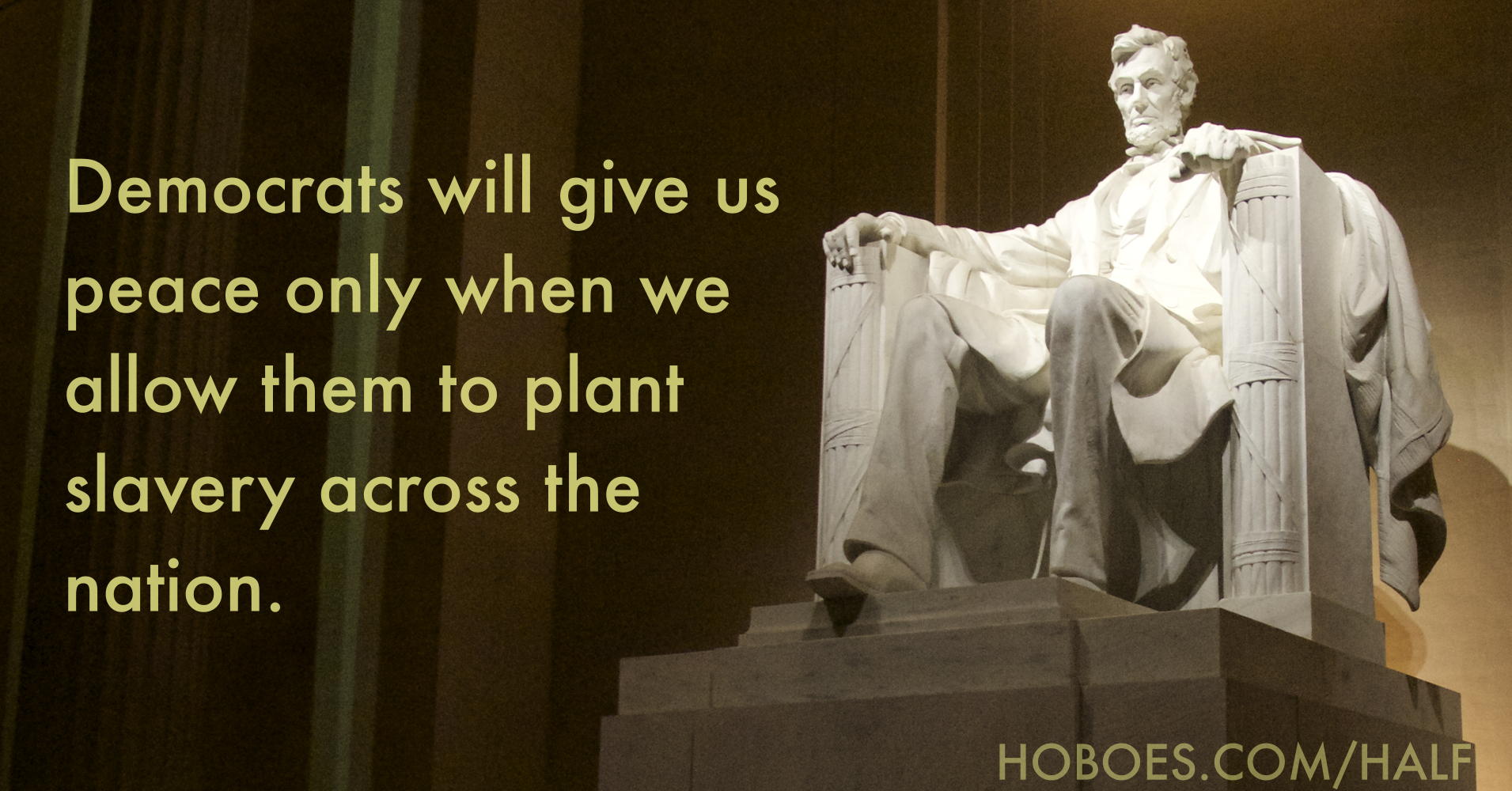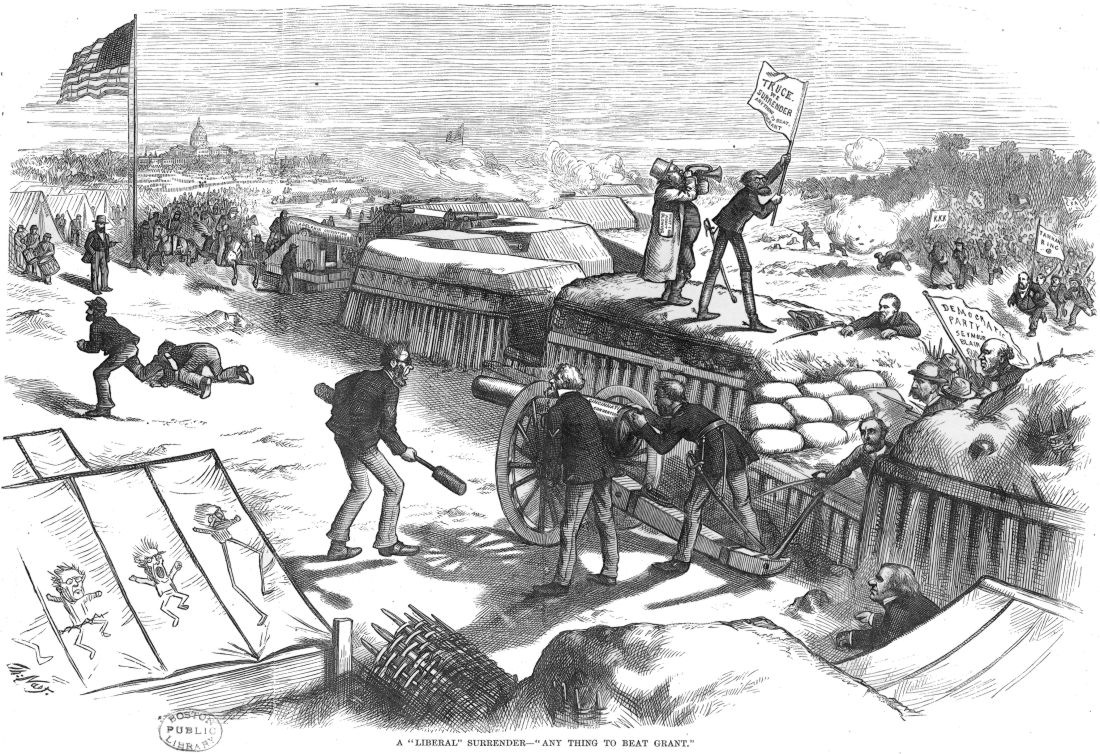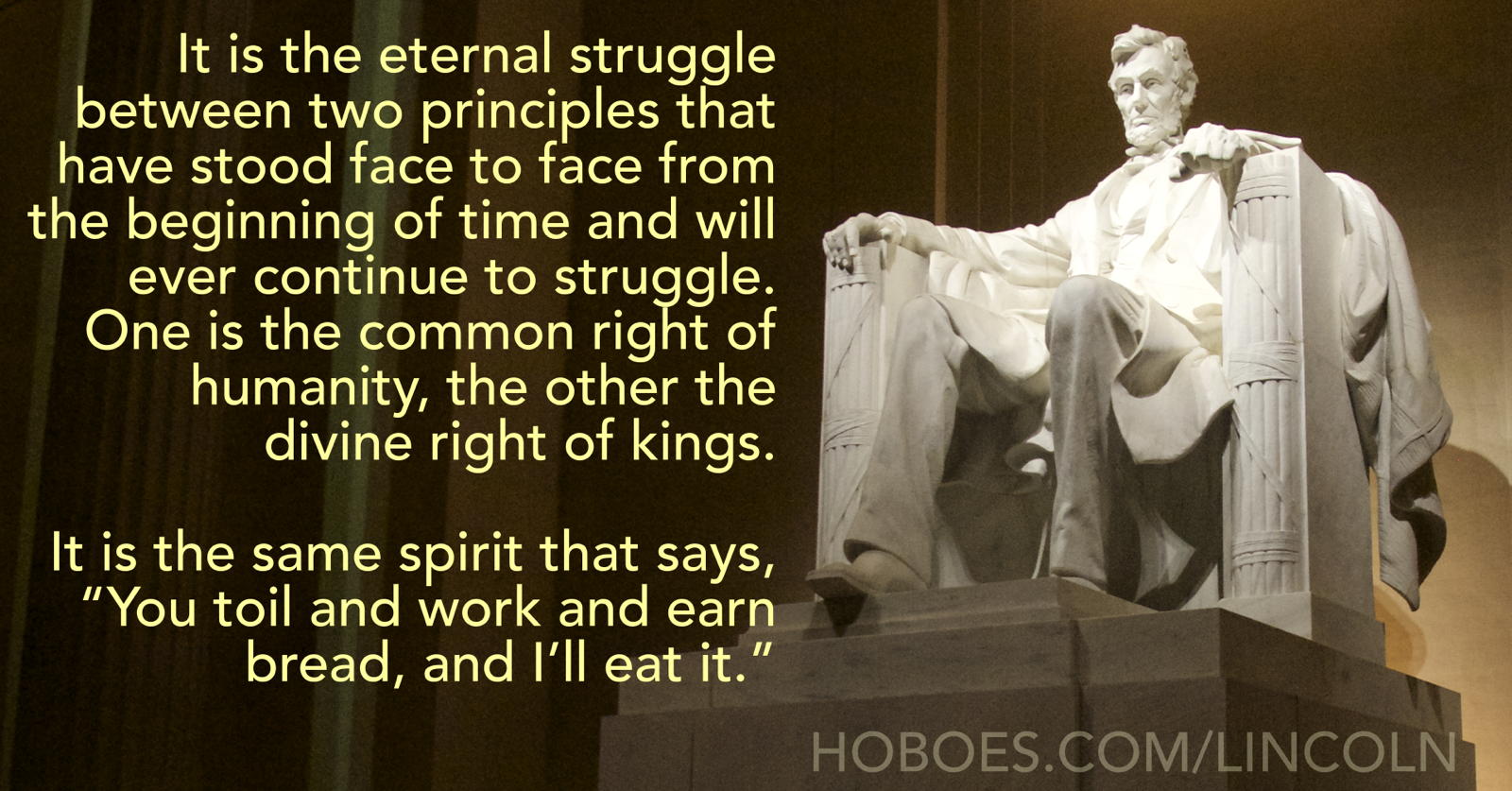Embarrassed by our president
This is a little late for veteran’s day, but I taught a Podcasting 101 tutorial last week and for the example podcast I had the students read from the Gettysburg address:
Four score and seven years ago, our fathers brought forth on this continent a new nation, conceived in Liberty, and dedicated to the proposition that all men are created equal. Now we are engaged in a great civil war, testing whether that nation, or any nation, so conceived and so dedicated, can long endure.
We are met on a great battle-field of that war. We have come to dedicate a portion of that field, as a final resting place for those who here gave their lives that that nation might live.
It is altogether fitting and proper that we should do this. But, in a larger sense, we can not dedicate—we can not consecrate—we can not hallow—this ground. The brave men, living and dead, who struggled here, have consecrated it, far above our poor power to add or detract.
The world will little note, nor long remember what we say here, but it can never forget what they did here. It is for us the living, rather, to be dedicated here to the unfinished work which they who fought here have thus far so nobly advanced.
It is rather for us to be here dedicated to the great task remaining before us—that from these honored dead we take increased devotion to that cause for which they gave the last full measure of devotion—that we here highly resolve that these dead shall not have died in vain—that this nation, under God, shall have a new birth of freedom—and that government of the people, by the people, for the people, shall not perish from the earth.
It seems appropriate for veteran’s day this year. However, that’s not why I’m posting it. I chose it because it was a short text that many people are familiar with. It’s also a relatively non-controversial text, unlike the bill of rights that I used to use as an HTML exercise back in the days when people created HTML by hand. Those of you who have read It Isn’t Murder If They’re Yankees have seen the conversation that ensued. In my case, however, I wasn’t fired, though I continued to use it.
But while taking a few paragraphs from Wikipedia for the commentary section of the podcast, I ran across the following quote from the Chicago Times:
The cheek of every American must tingle with shame as he reads the silly, flat and dishwatery utterances of the man who has to be pointed out to intelligent foreigners as the President of the United States.
A little research found a few more such references to our President’s silly remarks. The Harrisburg Pennsylvania Patriot and Union:
We pass over the silly remarks of the President; for the credit of the Nation we are willing that the veil of oblivion shall be dropped over them and that they shall no more be repeated or thought of.
It’s amazing what you hear when you listen through a haze of unreasoning partisanship.
- June 5, 2019: The enduring hate speech of Stephen Douglas in Canada
-

While it was amazing seeing just how closely modern conservatism resembles the principles of Abraham Lincoln, it’s disappointingly just as true that Lincoln’s debate rival Stephen Douglas espoused and argued vehemently for what we would today describe as the principles of the left—the vision of the anointed. He believed that smart people should make decisions; that it was the smart person’s burden to be responsible for the life of the masses. It was, in his view, the responsibility of government.
That’s why he supported slavery: the slave’s owner took on the burdensome task of deciding what the slave’s best interests were. This, in his view, freed the slave.
That kind of sophistry continues among the left today. Stephen Douglas was probably no more racist than Abraham Lincoln. But where Lincoln’s principles lifted him up, Douglas’s principles dragged him down.
It was hard not to think of Stephen Douglas while listening to Canadian politicians telling Canadian citizens why laws need to ban speech politicians disagree with. That it’s important for police to visit people, not for doing something illegal, but because they’re saying things the politicians don’t like.
Committee Member Colin Fraser began with the standard sophistry that has been the left’s strategy since at least Douglas. He argued that free speech does not mean consequence-free speech. This is true; it means that, for example, you have no right to not be disliked for your speech, no right to be disagreed with, no right to shut down free speech from others that might show your own free speech to be wrong. But what Fraser turns this into is that you have no right to speech that he thinks is wrong. If he thinks there ought to be consequences to your speech, it is his responsibility to enact those into law. Further, public figures should be compelled to speech that he approves of. It’s the age-old logic of the tyrant: it must either be criminal or required.
Free speech comes with responsibilities, after all. And one of those responsibilities is to say what Canada’s Standing Committee on Justice and Human Rights wants you to say.
Free speech doesn’t mean what you’re compelled to say by the state. They’re getting free speech completely backward. They’re defining it as censorship and compelled dogma.
- January 23, 2019: Failure theater in the Syrian war
-
There is a theory which states that if ever anyone discovers exactly what the Universe is for and why it is here, it will instantly disappear and be replaced by something even more bizarre and inexplicable.
There is another which states that this has already happened. — Douglas Adams (The Hitchhiker’s Guide to the Galaxy)
There is a theory that beltway Democrats and Republicans are not opposed to each other, that they merely delegate issues to continually fail on. Failure theater. That is, they pretend to oppose something but mean to fail. Syria calls that to mind now. Democrats, it turns out, actually want troops in Syria; they were opposing it merely for failure theater. When President Trump decided that our mission in Syria was finished, they were forced into showing their true position.
In that theory, it doesn't matter that Trump is a Republican, or that they hate him. They’d be flip-flopping even if, say, President Obama had chosen to pull out of Syria.
The other theory, of course, is that Democrats reflexively oppose whatever Trump does. They call for the firing of Comey; Trump fires him, they oppose the firing of Comey. They call for leaving Syria, Trump announces we’re leaving Syria, and they don’t call it a win for their policy, they pivot to opposing leaving Syria. They call for border walls, Trump campaigns and wins on border walls, they don’t call it a win, they oppose border walls.
Up until now, I've thought that the latter theory explains the Democrats flip-flopping better and that the former is conspiracy-theory territory. But their turn-around on Syria makes it much more believable. Most people, Democrats or Republicans, don't really care one way or another who runs the FBI or whether we have drones killing terrorists in the Middle East. But a lot of people who vote Democrat do care about whether we are engaged in foreign wars. Opposition to war overseas, especially in the Middle East, is one of the their base’s defining stances.
- November 5, 2018: Abraham Lincoln’s conservative principles
-
This election is exactly 158 years from Abraham Lincoln’s election as United States President—on November 6, 1860. Sometimes it seems as though our United States are as disunited now as they were then.
I’ve been slowly reading through Abraham Lincoln’s letters and speeches, and one of the really striking things about them is how durable the basic tenets of conservative political thought have been. The right of people to be just left alone whether you agree with them or not; the necessity of equality under the law; the right each individual has to the fruits of their own labor. This would not have been called conservative at the time, as the labels we apply to political movements have changed since then. But they are clearly the conservative philosophy as we now understand it, and were the bedrock of Lincoln’s political philosophy.
Just as striking is how alien these principles were to the enemies of conservative thought, to the beltway class. If you thought slavery was wrong, you believed in setting the slave over the non-slave. If you disagreed that slavery should spread, your disagreement was the same as—or worse than—violence. And if you believed that everyone had the right to the fruits of their own labor, you were a hypocrite who believed that the national government should regulate everything from cranberries in Maine to oysters in Virginia.
There was no sane common ground with the Democrat’s leadership then just as there isn’t now. If you’re not for banning effective self-defense, they say, you’re for blood in the streets. If you’re not for government control over health care and doctors, you’re for bodies piling up in inner cities. There is no understanding of the universal benefits of a democratic republic, of letting people buy, sell, and work the way they want, of ensuring that the law is simple, understandable, and evenly applied, of just letting people be.
Equality of opportunity, as we call it today, simply didn’t register with the Democrat leadership then any better than it registers with them today. As soon as Lincoln talked about equality of opportunity, Douglas heard equality of outcome. Equality of opportunity was so alien, then as now, that they simply couldn’t understand what Lincoln was saying.
- September 26, 2018: The cyclic transmogrification of the Republican Party
-

“[They will allow us peace only] if we will all stop and allow Judge Douglas and his friends to… plant the institution [of slavery] all over the nation…”
Following the election of a “coarse”, “vulgar clown” of a Republican, “a man of no intelligence”, to the presidency, establishment politicians got together in Washington to save the policies he threatened to destroy. Republicans were begged by a tearful resistance—and establishment—to betray the extremists who elected them. Many Republicans listened more to the establishment than to the voters who elected them. Republicans loyal to the President feared—and Democrats and establishment Republicans hoped—that the electoral college would interfere and block this radical “ignoramus” from the White House. “Wise statesmen” reminded the Republican president-elect that he had been elected without a majority of votes cast and implored him to maintain the policies of his Democrat predecessor.
Mobs ruled the streets protesting the election. The country was as literally divided as it could ever be.
The year was 1860; the candidate was our first Republican president, Abraham Lincoln. And the Democrat’s policy that the DC establishment tried to save was slavery. Republicans who opposed slavery were disparagingly called “ultras” by the DC establishment. That is, extremists, outside the pale of cultured Washington. When real extremists had earlier raided Harper’s Ferry in then-Virginia, the Democrats and their press tried to pin the violence on Republicans.1
The resistance outside of the government did their best to undermine the new administration. Copperheadism flourished in “areas that had been solidly in favor of the Democrats… treasonous activities of all kinds were prevalent in these sections.”2
- Gettysburg Address at Wikipedia
- “One of the greatest speeches in American history. In fewer than 300 words delivered over two to three minutes, Lincoln invoked the principles of human equality espoused by the Declaration of Independence and redefined the Civil War.”
- It Isn’t Murder If They’re Yankees
- “The true story of rural Virginia schoolteacher Carolyn Purcell, the small town of Walkerville, and the Washington, DC foolkiller known as the Quiet Man, as told by one of the Quiet Man’s famous victims.”
- Abraham Lincoln: The War Years•
- A four-volume work by Carl Sandburg covering Lincoln’s presidency in detail.
- Ideas are always more than battles
- “Reaction to Lincoln’s address was frequently divided along political lines. Newspapers critical of the President had snide things to say about the speech’s brevity and inappropriateness to the occasion.”
More unreasoning partisanship
- The ruling class’s unexpectedly old clothes
- I recently ran across early use of “unexpectedly” for a conservative’s strong economy, referring to the early 1981 market recovery under President Reagan.
- Why do gun owners think the left wants to take our guns?
- Gun owners think the left wants to take away guns because the left keeps refusing commonsense gun laws in favor of laws that ban guns.
- Corpseman resurrected: correcting Betsy DeVos
- The left has once again decided that the way those people speak is ignorant, and that those people are too stupid to hold public office.
- Why is the country so divided?
- Because you keep trying to tell everyone else what to do.
- Divisive double standards
- It’s a hypocritical form of divisiveness, calling for togetherness and reason whenever your side commits a crime, and engaging in unreasoning partisanship when you can find some way to pin it on others.
- 32 more pages with the topic unreasoning partisanship, and other related pages


